|
Progressive Men of
Iowa
1899
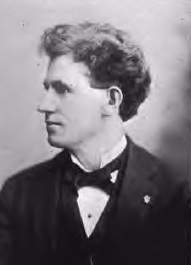 BOWEN. E.
E., now county attorney for Dubuque county, who
was born and raised in Dubuque, has the advantages
of that city to thank for the high position in his
chosen profession his own energies have given him.
Mr. Bowen is the son of the late John Bowen, and
was born in West Dubuque June 17, 1869. BOWEN. E.
E., now county attorney for Dubuque county, who
was born and raised in Dubuque, has the advantages
of that city to thank for the high position in his
chosen profession his own energies have given him.
Mr. Bowen is the son of the late John Bowen, and
was born in West Dubuque June 17, 1869.
In the practice of his
profession he has been very successful, and is
recognized as one of the leaders among the members
of the Dubuque bar. His able conduct of cases
before the courts has won for him the encomiums of
the judges and the respect and esteem of his
brother attorneys. Mr. Bowen was educated in the
Dubuque public and parochial schools. He studied
at St. Joseph's college and completed the business
course at Bayless' college. He studied law with
Powers, Lacy & Brown, and Alphonse Matthews
and Judge M. C. Matthews and graduated from the
law department of the State University of Iowa on
the 5th of June, 1892. On being admitted to the
bar he started to practice for himself and was
signally successful from the start and soon built
up a business that made him independent Two years
ago he entered into partnership with T. J.
Fitzpatrick, and the firm of Bowen &
Fitzpatrick is looked upon as one of the most
successful and honorable in Dubuque county, which
now has a population of 70,000. He was elected to
the office of county attorney on the 8th of
November, 1898.
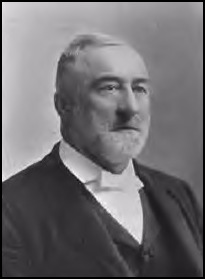 BURCH, George B., of
Dubuque, was born at Lyons, Wayne county, N. Y.,
on the 22d of March, 1836. His parents were James
H. Burch and Ruhama S. Burch, nee Dunn, both
natives of New York. His early education was
obtained at the public schools. His father being
in moderate circumstances could give him but
little assistance, and at the age of 14 he
commenced life for himself by entering the employ
of a druggist, as clerk. Later he served in
several clerical positions, and in February, 1855,
moved to the west, and settled in Portage, Wis.,
where, in 1859, he formed a partnership in the
drug business, under the firm name of Burch &
Lewis. In December of the same year he sold his
interest in the drug business and removed to
Necedah, Wis., in the lumber district, where, for
a year, he was employed as bookkeeper. In 1861 he
entered the lumber business for himself, by
purchasing a small lumber mill in Necedah, and
engaged in the manufacture of lumber. He removed
to Dubuque in August, 1869, and there established
a lumber business in connection with his mills in
Necedah. Meanwhile his business in Necedah had
steadily increased from year to year, and at one
time he was president of two large lumbering
companies there, which were later consolidated
into one, the Necedah Lumber company, and is still
in operation, he being
president. BURCH, George B., of
Dubuque, was born at Lyons, Wayne county, N. Y.,
on the 22d of March, 1836. His parents were James
H. Burch and Ruhama S. Burch, nee Dunn, both
natives of New York. His early education was
obtained at the public schools. His father being
in moderate circumstances could give him but
little assistance, and at the age of 14 he
commenced life for himself by entering the employ
of a druggist, as clerk. Later he served in
several clerical positions, and in February, 1855,
moved to the west, and settled in Portage, Wis.,
where, in 1859, he formed a partnership in the
drug business, under the firm name of Burch &
Lewis. In December of the same year he sold his
interest in the drug business and removed to
Necedah, Wis., in the lumber district, where, for
a year, he was employed as bookkeeper. In 1861 he
entered the lumber business for himself, by
purchasing a small lumber mill in Necedah, and
engaged in the manufacture of lumber. He removed
to Dubuque in August, 1869, and there established
a lumber business in connection with his mills in
Necedah. Meanwhile his business in Necedah had
steadily increased from year to year, and at one
time he was president of two large lumbering
companies there, which were later consolidated
into one, the Necedah Lumber company, and is still
in operation, he being
president.
He had gradually become
interested in other large enterprises, and in 1881
sold out his lumbering interests in Dubuque,
although still retaining his interests in Necedah.
In January, 1884, he was elected a director and
president of the Second National bank of Dubuque,
and has continued to hold the office ever since.
This bank was organized in 1876, with a capital of
$100,000, which was increased to $150,000, then to
$200,000, then $400,000, and is the largest in the
city. Knowing well that competitive railroad lines
added to the material prosperity of the city, he
became active in building the Dubuque &
North-western railroad, and was elected president
of the company. The road is now part of the
Chicago Great Western railroad system. Mr. Burch
is still largely interested in it and is closely
allied with its management. The Julien
house, one of the finest and most commodious
hotels ever erected in a city the size of Dubuque,
probably owes its existence to his enterprising
and progressive spirit. Besides the offices
already mentioned, he is president of the Necedah
Lumber company, of Necedah, Wis.; a director and
treasurer of the Key City Gas company. He is also
vice-president and director of the Dunleith &
Dubuque Bridge
company.
He was one of the
originators of the Finley hospital, and has been a
trustee and treasurer since its organization. He
has been elected mayor of Dubuque three different
times. In 1876 he was the unanimous choice of both
parties, and was chosen without opposition; he was
re-elected in 1877, and again in 1888, but
declined further election. It is conceded that he
filled the position with great
credit.
He was married on the
27th of February, 1860, to Miss Ellen H. Merrill,
daughter of Hon. Samuel D. Merrill, of
Vermont.
They have six children living. Mr. Burch
has been a resident of Dubuque for over a quarter
of a century, and during all that time no man has
labored more earnestly, or more steadily, to
advance the material prosperity of the city than
he has. He has become an acknowledged leader in
most of the plans that have been formulated to add
to the comfort and wealth of the
people.
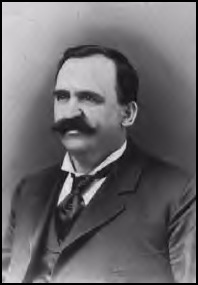 SCHROEDER, Frank Nicholas,
president of the Schroeder-Kleine Grocery company,
of Dubuque, is one of the earliest settlers of the
Key city. He came with his parents from Mobile,
Ala., to New Orleans and from New Orleans to
Dubuque on a steamboat, landing in that city May
17, 1855. He was born in Deikirch in the grand
duchy of Luxembourg, Germany, July 16, 1849. His
father was Nicholas Schroeder, a carpenter and
builder, and his mothers maiden name was Josephine
Grasser. Her father, Nicholas Grasser, was a
captain in the French army and was with Napoleon's
army in Russia when the Russians burned the city
of Moscow and left Napoleon's army to starve. He
was one of seven survivors who succeeded in
returning to France. The rest of the company were
killed in battle, or perished with hunger and
cold. The Schroeder family early emigrated to
America to seek a wider field and better
opportunities in life. SCHROEDER, Frank Nicholas,
president of the Schroeder-Kleine Grocery company,
of Dubuque, is one of the earliest settlers of the
Key city. He came with his parents from Mobile,
Ala., to New Orleans and from New Orleans to
Dubuque on a steamboat, landing in that city May
17, 1855. He was born in Deikirch in the grand
duchy of Luxembourg, Germany, July 16, 1849. His
father was Nicholas Schroeder, a carpenter and
builder, and his mothers maiden name was Josephine
Grasser. Her father, Nicholas Grasser, was a
captain in the French army and was with Napoleon's
army in Russia when the Russians burned the city
of Moscow and left Napoleon's army to starve. He
was one of seven survivors who succeeded in
returning to France. The rest of the company were
killed in battle, or perished with hunger and
cold. The Schroeder family early emigrated to
America to seek a wider field and better
opportunities in life.
The son, of whom we
speak, earned his first money in his new home
carrying papers. He began his business career as a
porter in the wholesale grocery house of W. H.
Rumpf, in Dubuque, January 19, 1865. He was
steadily advanced; became shipping clerk and later
house salesman, and continued with Mr. Rumpf until
August 1, 1882. During that month he formed a
partnership with J. H. Kleine, under the firm name
of Schroeder & Kleine, wholesale grocers. This
firm carried on a prosperous business until
November 1, 1892, when, with Mr. J. H. Kleine, Mr.
Fred Rumpf and Mrs. J. P. Farring, he
incor-porated the Schroeder-Kleine Grocery
company, of which Mr. Schroeder is president. He
has always been a member of the democratic party,
and in 1897 was chairman of the Dubuque county
committee.
He was a delegate to the democratic
national convention in 1884, and is now county
treasurer of Dubuque county, elected in 1895 and
re-elected without opposition in 1897. He belongs
to the Pius St. Alphonsus Benevolent society, R.
C. M. P. of the state of Iowa, Dubuque Germania
society, Dubuque Luxembourger society, Dubuque
Business and Traveling Men's association, and the
Catholic church.
He was married November
7, 1871, to Katherine Beck. They have
seven children: William, born May 20, 1874; George
W., born June 10, 1876; Anna, born January 17,
1878; John P., born May 12, 1881; Mary, born
November 23, 1882; Kate, born May 27, 1885; and
Josephine, born August 17,
1891.
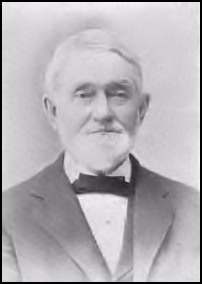 STOUT, Henry Lane, of
Dubuque, is the head of "The Knapp, Stout &
Co.
Company," which
has a capital of $4,000, 000, and is one of the
largest concerns of its kind in the United States,
and probably in the world. Mr. Stout is an
illustrious example of that class of men who, by
the employment of brain and energy, have risen to
a high and honored position. His career
illustrates forcibly what can be accomplished by
energy, perseverance, steadfastness of purpose and
business ability. He was born in Huntington
county, N. J., October 23,1814. His father,
William Stout, and his mother, Eleanor Lane Stout,
were both natives of New Jersey. His grandfather
was a participant in the early history of the
country and fought in the revolutionary war. After
its close he was a member of the legislature of
New Jersey many years. STOUT, Henry Lane, of
Dubuque, is the head of "The Knapp, Stout &
Co.
Company," which
has a capital of $4,000, 000, and is one of the
largest concerns of its kind in the United States,
and probably in the world. Mr. Stout is an
illustrious example of that class of men who, by
the employment of brain and energy, have risen to
a high and honored position. His career
illustrates forcibly what can be accomplished by
energy, perseverance, steadfastness of purpose and
business ability. He was born in Huntington
county, N. J., October 23,1814. His father,
William Stout, and his mother, Eleanor Lane Stout,
were both natives of New Jersey. His grandfather
was a participant in the early history of the
country and fought in the revolutionary war. After
its close he was a member of the legislature of
New Jersey many years.
Their son Henry was
reared on the farm, where he acquired the habits
of industry and economy which have so largely
contributed to his subsequent success. His
educational advantages were confined to the public
schools. In his 16th year he began life for
himself and worked at the builder's trade, in
Philadelphia, Pa., until 20 years of age. In 1836
he settled in Dubuque with less than $100 in
money, but possessed of good health, a hopeful
heart and. a purpose to grow up with the country.
For a time he was occupied with building and
mining, and in both was moderately successful,
though his health was not good during the first
ten years of his residence in Dubuque. The
country was somewhat unhealthful and physicians
advised him to return east, but he refused to do
so, being determined to succeed in his original
plan, and after becoming acclimated he enjoyed the
best of health. In 1853 Mr. Stout invested his
capital in the lumber business, purchasing an
interest in the firm of Knapp & Taintor, which
was then a small business. The name was changed to
Knapp, Stout & Company, and Mr. Stout's
influence at once made itself felt very strongly.
He infused life into the business, and success
rewarded the combined efforts of himself and
partners. The business soon grew to gigantic
proportions. Mr. Stout has been interested in the
business over forty-six years, and he and his
partners have managed it so successfully that
today it is one of the largest businesses of its
kind in the world, and the oldest under one firm
name.
In March, 1878, the concern was
incorporated as "The Knapp, Stout & Co.
Company," with a nominal stock of $2,000,000,
which has since been increased to $4,000,000,
although the actual cash value of their holdings
is several times larger than that amount. The
present officers (July, 1899,) are: H. L. Stout,
Dubuque, president; Andrew Taintor, Menomonee,
Wis., vice-president; L. S. Taintor, Menomonee,
Wis., secretary; John H. Douglas, St. Louis, Mo.,
treasurer. They have mills and yards at Rice Lake,
Wis.; Cedar Falls, Wis.; Dubuque, Iowa; Menomonee,
Wis.; Downsville, Wis.; Fort Madison, Iowa, and
St.
Louis, Mo., and their personal and real
property extends from Lake Superior to New
Orleans. Their annual output is about 125,000,000
feet. The policy of the company has always been to
encourage settlement upon their cut lands, and
most liberal terms are made by them to would -be
settlers. There are in the employ of Knapp, Stout
& Co., at the present time, hundreds of men
who have literally grown gray in their service,
many of them having been with the company for
twenty-five years or more. Faithful service is
expected and required and it receives a liberal
reward. Besides its large lumbering interests, the
company conducts large stores near its mills where
large amounts of merchandise are annually
sold.
Mr. Stout has always
been a great admirer of horse flesh and has always
been a lover of trotting horses; partially to
gratify this interest and also partially for
profit, he and his younger son, Frank D. Stout,
entered into the business of breeding and raising
the highest grade of trotting stock. Highland
stock farm has become very prominent and there
some of the finest and most valuable trotting
horses in the United States have been bred and
raised. In this business, as in all others in
which Mr.
Stout has become interested, no outlay is
considered too great, and no exertion too much to
attain eminent success. In 1886, the private
citizens of the west were startled, and even
horsemen were surprised, when F. D. Stout paid
$22,000 for the stallion Nutwood, at that time 16
years old.
That they were justified in making this
expenditure is proven by the fact that Nutwood
became the " king of trotting sires," and proved a
remunerative financial investment. He leads all
sires of his age in both first and second
generations.
Mr. Stout was twice
elected mayor of Dubuque and has filled many local
offices of honor and trust. He has been a director
and stockholder in most of the railroads coming to
Dubuque and takes great interest in the
development of the enterprises of the city and
vicinity. In politics he is a republican, but his
business has engrossed all his time and left none
for political
matters.
On the 23d of October,
1845, Mr. Stout was married to Miss Eveline
Demming, a native of New York state. The wedded
life of Mr. and Mrs. Stout, which began so
auspiciously, was rewarded with happiness and
prosperity, and the faithful wife and mother was
spared to see her children grow to manhood and
womanhood. These are James H. Stout, born in
September, 1848; Frank D. Stout, born in March,
1854; Fannie D., born in August, 1858, now
Mrs.
Fred O'Donnell, and Jennie E., born in
December, 1851, now Mrs. A. W. Daugherty. Mrs.
Stout died May 12, 1879. Such is a
brief biography of Henry L. Stout. His name
is known throughout the entire country; he has
climbed the ladder of success step by step until
he has reached the topmost round, and now he can
look back upon his career and say truthfully that
his life has been well spent. His has been
self-attained success; no man ever aided him in
business, and today he can safely be placed among
the most successful men of the
west.
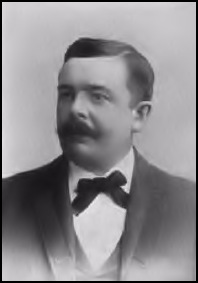 TORBERT, Willard H., the
well-known wholesale druggist, of Dubuque, is a
native of the state of New York, and hie ancestors
on both sides have been distinguished
practitioners of both medicine and
pharmacy. TORBERT, Willard H., the
well-known wholesale druggist, of Dubuque, is a
native of the state of New York, and hie ancestors
on both sides have been distinguished
practitioners of both medicine and
pharmacy.
His grandfather, Samuel
Torbert. M. D., was health officer of the port of
New York under Gov. Daniel
Tompkins. His father, the late Dr. H. G. Torbert,
of Camden, was one of New York's most
distinguished practitioners. His mother was the
daughter of Joshua Ransom, M. D., an illustrious
member of the medical fraternity, and her
grandfathers on each side, Capt. Elihu Warner, and
Lieut. Joshua Ransom, were both distinguished
soldiers of the American revolution. Besides those
who won distinction in the practice of medicine
and with whom the name of Torbert is entwined in
honorable kinship, are others prominent in the
history of the country. Among them may be named
the McCreas, McNairs, and Lieutenant Burrows of
revolutionary fame. In the same direct line
descended General Torbert, who distinguished
himself in brave and gallant service through many
engagements of the civil war. And so on through
years, early and late, the family history records
traditions of an esteemed and honored race who
have figured among stirring scenes and notable
events, with which the people of the country are
familiar.
Willard H. was born in
Camden, Oneida county, N. Y. In preparing for
college he attended Falley seminary, at Fulton, N.
Y., and later completed his education at Princeton
college. His earliest experience as a druggist was
in Syracuse, N. Y., after which he engaged in the
drug business at Adams, Jefferson county, N. Y.
Mr. Torbert made his first acquaintance with
Dubuque in 1864, and in 1868 became a resident of
that city. In 1868 he purchased an interest in the
drug store which had been established by Dr.
Timothy Mason in 1836, being the oldest
establishment of the kind in Dubuque or in Iowa.
Later he be-came its sole proprietor and soon
broadened its trade into one of the largest among
western drug houses, while its wholesale business
extends over several western states and
territories. In 1880 Mr. Torbert was largely
instrumental in securing a modification of the
state laws regulating the sale of liquor by
pharmacists and in securing the repeal of the
obnoxious features. This
section was so repealed or reconstructed that no
further protest or complaint was heard from the
pharmacists of the state, who had hitherto been
sorely inconvenienced and embarrassed in this
branch of their
business.
In 1888 Mr. Torbert was
elected president of the State Jobbers and
Manufacturers' association, and again found an
active field for the exercise of his diplomatic
acumen. He was a potent factor in securing the
enactment of a law regulating rates between
railroads and shippers of the state. This measure
placed Chicago and Iowa jobbing points on a parity
and resulted in untold benefits to the jobbers and
manufacturers of Iowa in all branches of their
business and trade, and has proven of great value
to the railroads themselves. In 1888 Mr. Torbert
was elected president of the Iowa State
Pharmaceutical association, and in 1889 was
unanimously re-elected to a second term, an honor
never before extended to any member in the history
of the association. At a meeting of the
pharmaceutical association at New Orleans and at
Louisville, Mr. Torbert was a recognized leader
and champion of the interests of the retail
druggists of the country. The Pharmaceutical Era
says: " In selecting him as chairman of the
committee to represent the retailers in the
tripartite conference in the further and final
execution of the Apha plan, it may be confidently
stated that the retail druggists have a wise, true
and faithful friend at court, as Mr. Torbert never
spares time nor effort when the interests of the
retail druggists are at stake. If the plan adopted
by the tripartite fails of ultimate success, it
will not be the failure of his untiring efforts to
secure the desired result as chairman of the
commercial section of that body." Mr. Torbert is a
prominent member in the National Wholesale
Druggists' association, also a member of the Iowa
Society of Sons of the Revolution. His ability and
influence as a member of the Interstate Retail
Druggists' league and as the Iowa representative
of the state executive committee, has met with
deserved and flattering recognition. In all his
dealings with his fellowmen in public and private
association, his abilities and integrity have been
unquestioned. He also possesses many qualities
that would eminently fit him for a political
career, had he chosen to take advantage of
opportunities that from time to time have offered
their allurements in that direction. Mr. Torbert
it thoroughly familiar with political methods, is
an earnest and eloquent public speaker and an
engaging conversationalist. He has been mentioned
in connection with many distinguished public
positions which he would have filled with ability
and honor. He has been frequently sought by the
republican party, with which he is prominently
identified, as a candidate for the highest office
within its gift in the state. But he is too
thoroughly devoted to his important business
interests to forsake them for a political career.
He was president of the Dubuque Commercial club
and is now president of the Dubuque Jobbers and
Manufacturers' union. He was vice-president of the
American Pharmaceutical association, the largest
society of pharmacists in the
world.
He is an earnest worker in
whatever direction his sympathies and convictions
are enlisted, a genial companion in the social
walks of life, upright in his dealings with men
and a useful member of the community with which he
has been so long and honorably identified. Mr.
Torbert was married January 2, 1868, to Mary E.
Kirk, a daughter of Rev. R. R. Kirk and Mary
Doxtater Kirk. The
y have one daughter, Mary T., now the
wife of Maj. Glen Brown, of
Dubuque.
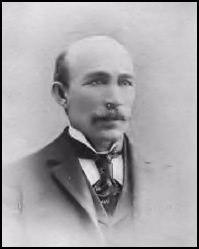 TSCHIRGI, Matthew, Jr., of
Dubuque, is the son of Matthew Tschirgi, for years
prominent in the brewing business, now retired.
The father was born in St. Gallen, Switzerland,
and emigrated to the United States when 18 years
of age. He was interested in the erection of the
first brewery built in Iowa, known as Heeb's
brewery, at Dubuque, and, being himself a
practical brewer, as was his father before him,
made the first brew in the new establishment. Although
now past 73, he is still active and vigorous, and
takes a keen interest in the business affairs of
his children. One son, Arnold, he has established
in the brewing business at Sheridan, Wyo., and
George and Frank are fitted out with extensive
improved ranches near that city. Two
daughters, Catherine and Louise, are the wives of
Francis Jaeger and J. Traut, respectively,
prominent businessmen of Dubuque. John W. is
employed in the Dubuque Malting company's brewery,
an establishment which has more than $300,000
invested in its plant. The very latest improved
and most expensive electrical, steam and
refrigerator machinery is employed, and, of
course, the person in charge must not only possess
a scientific knowledge of the art of brewing, but
must be familiar with every detail in the
management of the immense concern. It is such a
position of trust and responsibility that Mr. John
W. Tschirgi is at present filling. The father has
lived to see the great advancement which has
marked the brewing business since the time when he
ground the grain in a coffee mill and distributed
the product of his brew to customers in person by
wheelbarrow, and he has also watched, with no less
pleasure, the phenomenal development of his
adopted city and state in all other lines of
manufacture and trade. The mother, whose maiden
name was Catherine Zollicoffer, was the eldest
daughter of the late George Zollicoffer, a pioneer
settler of Dubuque, well known and highly
respected. TSCHIRGI, Matthew, Jr., of
Dubuque, is the son of Matthew Tschirgi, for years
prominent in the brewing business, now retired.
The father was born in St. Gallen, Switzerland,
and emigrated to the United States when 18 years
of age. He was interested in the erection of the
first brewery built in Iowa, known as Heeb's
brewery, at Dubuque, and, being himself a
practical brewer, as was his father before him,
made the first brew in the new establishment. Although
now past 73, he is still active and vigorous, and
takes a keen interest in the business affairs of
his children. One son, Arnold, he has established
in the brewing business at Sheridan, Wyo., and
George and Frank are fitted out with extensive
improved ranches near that city. Two
daughters, Catherine and Louise, are the wives of
Francis Jaeger and J. Traut, respectively,
prominent businessmen of Dubuque. John W. is
employed in the Dubuque Malting company's brewery,
an establishment which has more than $300,000
invested in its plant. The very latest improved
and most expensive electrical, steam and
refrigerator machinery is employed, and, of
course, the person in charge must not only possess
a scientific knowledge of the art of brewing, but
must be familiar with every detail in the
management of the immense concern. It is such a
position of trust and responsibility that Mr. John
W. Tschirgi is at present filling. The father has
lived to see the great advancement which has
marked the brewing business since the time when he
ground the grain in a coffee mill and distributed
the product of his brew to customers in person by
wheelbarrow, and he has also watched, with no less
pleasure, the phenomenal development of his
adopted city and state in all other lines of
manufacture and trade. The mother, whose maiden
name was Catherine Zollicoffer, was the eldest
daughter of the late George Zollicoffer, a pioneer
settler of Dubuque, well known and highly
respected.
Matthew Tschirgi, Jr., was born in Dubuque,
Iowa, November 28, 1850. When he had finished the
common schools he entered the Michigan university,
at Ann Arbor, and graduated therefrom as a civil
engineer, in 1872. He began active work in his
profession in Dubuque that same year, and was
prominent in the surveying of the railroad from
that city to Burlington. In 1873 he established a
permanent office in Dubuque, and among other
things published a map of the city. He was elected
county surveyor in 1875, and appointed city
engineer in 1877, holding the last named position
continuously until 1891, with the exception of the
years 1888-9. His
practice includes civil and sanitary engineering,
plans for waterworks and sewer systems and bridge
construction. Among the
many engineering structures which he has designed
may be mentioned the stone arch highway bridge at
Elkader, Iowa; was engineer of the company which
built the bridge spanning the Mississippi river at
Dubuque, both of which stand as monuments to his
engineering skill. Since 1893 he has acted as
president and manager of the Dubuque Construction
company. In politics he is a republican, in
religion a Methodist. He is a member of the
Knights of Pythias. He was married in 1880 to Miss
Helene L. Schaad. They have four children: Martha
Bernice, Harold Magnus, Charles Corrance, and
Arthur Mason.
The information
on Trails to the Past © Copyright may be used in personal family history research, with source citation. The pages in entirety may not be duplicated for publication in any fashion without the permission of the owner. Commercial use of any material on this site is not permitted. Please respect the wishes of those who have contributed their time and efforts to make this free site possible.~Thank you! |